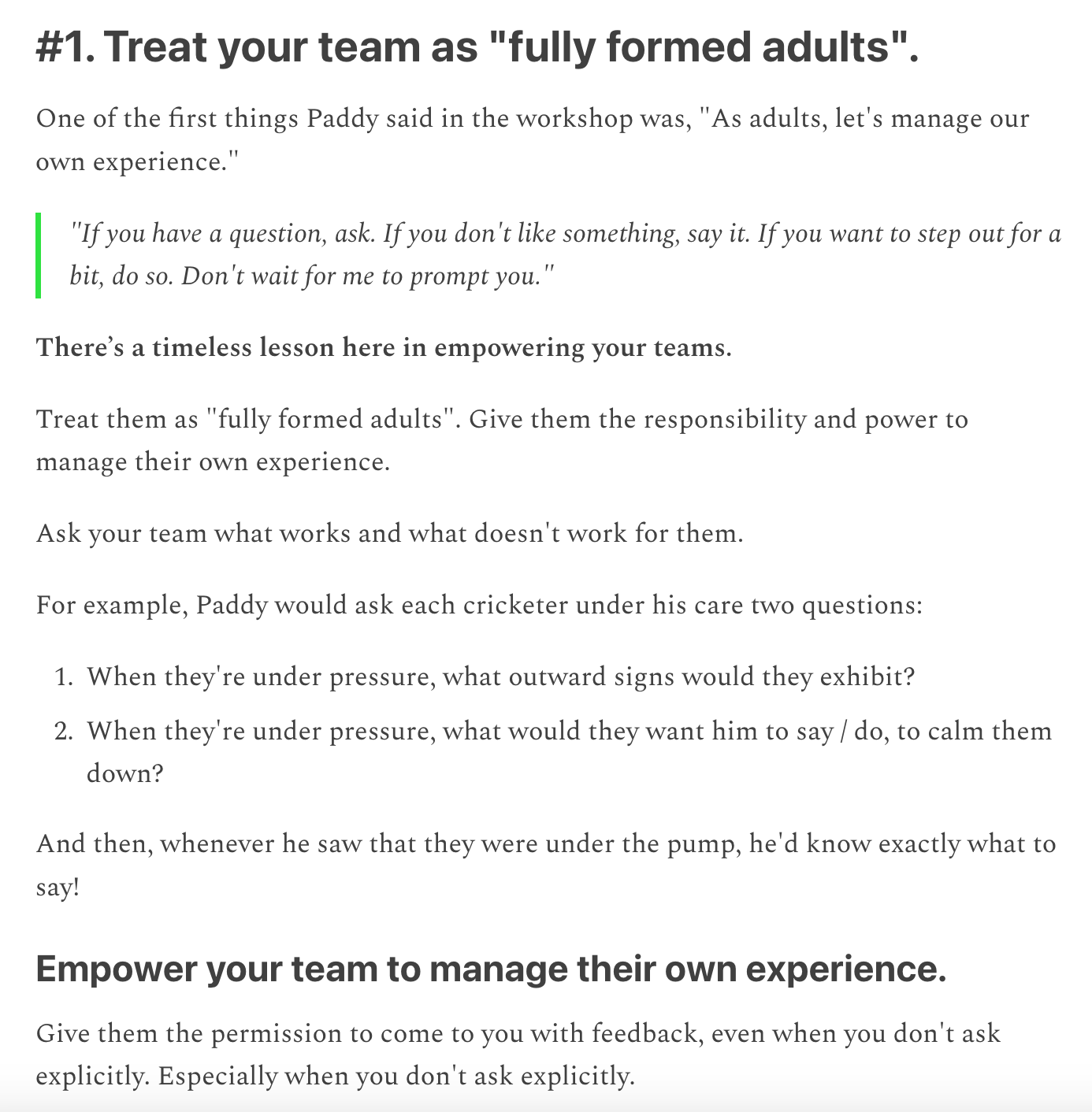🎯 If you play games where other people have the aptitudes and you don’t, you’re going to lose.
Your weekly dose of new ideas & inspirations
Hey, Pritesh here.
Welcome to those who joined us recently in this journey of discovering new ideas & inspirations.
We’ve reached post #110. Here’s a quick glance of what do we cover today:
📈 Growth model at Duolingo
🏏 Leadership lessons from Paddy Upton
🎙️ Conversation between Tyler Cowen & Seth Godin
🧠 The Chauffeur effect
🧑⚖️ Courtroom sketches
And much more…
If you enjoy reading “Stay Curious”, show your love by ❤️’ing it or leaving a comment or sharing it with a couple of your friends. Any support is highly appreciated.
And with that, let’s dive in.
1. Growth model at Duolingo
Sometimes typical growth indicators like DAU are not capable of providing actionable insights into actual user journey. It becomes difficult to design growth experiments. I’ve been thinking about other ways of understanding the user journey in such scenarios.
Erin Gustafson’s post for Duolingo blog “Meaningful metrics” provided a good model to think on this topic. It defines & focuses on metrics that indirectly impact DAU and identifies the movable metrics that matter. Through this way, the Duolingo team was able to identify hundreds of A/B test experiments to aid their growth process.
Their growth model can be summarized in the following diagram. Head over to the original post for details & how to use this.
If you’re up for some more ideas from Duolingo’s product & growth, I had covered some really interesting lessons in post #96.
2. Leadership lessons from Paddy Upton
For those who do not know, Paddy Upton was the Mental Conditioning coach of the Indian cricket team that won the world cup in 2011. Later, he delivered equally stellar results with South African cricket team & then with Rajasthan Royals in IPL.
Jitha shared 5 key lessons that he took away from a masterclass session with Paddy Upton. I found these highly insightful and actionable. I’ve been facing some challenges in my team and was evaluating possible ways to overcome those. Jitha’s post is a timely intervention and helped me look deeply in my leadership style.
This one is my favorite bit from the post.
3. Tyler Cowen talks to Seth Godin
I recently discovered Tyler Cowen’s podcast and love it for the diverse topics it covers. Tyler’s style of asking questions is quite unusual and makes the conversation real fun.
Recently, he hosted Seth Godin and they chatted on “Marketing, Meaning, and the Bibs We Wear”. What a conversation!
Sample this volley of questions that he threw:
Why is it that direct mail works at all?
To what extent is being good at marketing the same as being good at telling very short stories?
What has Trader Joe’s gotten right?
What has Whole Foods gotten wrong by comparison?
Taylor Swift is pretty popular. Obviously, people like the music, but what else is she getting right?
If you were called in as a consultant to professional baseball, what would you tell them to do to keep the game alive?
How do you think about the future of the NBA?
Which brand is doing a better job marketing, a Prius or a Tesla?
I loved this one on different between education & learning (I’ve snipped some parts to make it readable here):
TYLER:: What is the biggest problem with scaling the education itself?
GODIN: Oh, this one is really worth diving into because you’re a teacher too. There’s a huge difference between learning and education. Education is compliance-based, top-down authority, certificate-granting. It is checking the boxes and proving that you have this thing that used to be scarce is yours now. Learning is all autodidactic. Learning is, did you change by doing a thing?
COWEN: What, concretely, do we need to change to make that happen?
GODIN: Well, the first thing is accreditation and certificates because they have to go with education and they cannot go with learning. Learning is a body of work. It is who you become, not what piece of paper you get. When you watch somebody . . . Let’s say you want to make someone into a baseball fan. You don’t teach them the history of baseball, give them the baseball encyclopedia, quiz them about Abner Doubleday, and if they do well on the test, let them go to a game. What you do is get them enrolled in the journey of being a baseball fan because five minutes of it was fun, and they want it again. The next thing you know, they’re learning statistics because they want to. They’re learning facts because they want to, not because there’s going to be a test.
And finally this bit around ‘bibs we wear’
What a conversation!
4. The Chauffeur Effect
I found this snippet in the FF Insights newsletter worth sharing as is:
Rolf Dobelli’s lovely book, The Art of Thinking Clearly, offers a list of mental models many of us fall prey to. And often, at that. Consider the Chauffeur Effect, as he calls it. Its significance must be underscored in the times we live in.
“After receiving the Nobel Prize in Physics in 1918, Max Planck went on tour across Germany. Wherever he was invited, he delivered the same lecture on new quantum mechanics. Over time, his chauffeur grew to know it by heart: ‘It has to be boring giving the same speech each time, Professor Planck. How about I do it for you in Munich? You can sit in the front row and wear my chauffeur’s cap. That’d give us both a bit of variety.’ Planck liked the idea, so that evening the driver held a long lecture on quantum mechanics in front of a distinguished audience. Later, a physics professor stood up with a question. The driver recoiled: ‘Never would I have thought that someone from such an advanced city as Munich would ask such a simple question! My chauffeur will answer it.’
According to Charlie Munger, one of the world’s best investors (and from whom I have borrowed this story), there are two types of knowledge. First, we have real knowledge. We see it in people who have committed a large amount of time and effort to understanding a topic. The second type is chauffeur knowledge — knowledge from people who have learned to put on a show. Maybe they have a great voice or good hair, but the knowledge they espouse is not their own. They reel off eloquent words as if reading from a script.
To guard against the chauffeur effect, Warren Buffett, Munger’s business partner, has coined a wonderful phrase, the ‘circle of competence’: What lies inside this circle you understand intuitively; what lies outside, you may only partially comprehend. One of Munger’s best pieces of advice is: ‘You have to stick within what I call your circle of competence. You have to know what you understand and what you don’t understand. It’s not terribly important how big the circle is. But it is terribly important that you know where the perimeter is.’ Munger underscores this: ‘So you have to figure out what your own aptitudes are. If you play games where other people have the aptitudes and you don’t, you’re going to lose. And that’s as close to certain as any prediction that you can make. You have to figure out where you’ve got an edge. And you’ve got to play within your own circle of competence.’”
I subscribe to them for such gems, a quick commentary on anything critical from news cycles and some new topics worth exploring. The daily meme is a bonus!
5. Some ideas curated by Sari Azout
“Stay Curious” is a curation of what I take from the creators across the globe. I treat this as a window to the world of ideas for those who are exploring or have an insatiable curiosity to know more.
Sari Azout’s newsletter & Startupy tool is my inspiration for the quality of curation & diversity of ideas. It’s one of those places where I wander when I am looking for something new to explore and I am never disappointed.
Sample some of the ideas that I captured from a recent post - “Things I'm thinking about”
6. Light reads
Some interesting posts & essays that are well worth reading.
“How much is a smidgen?” by Claire Cock-Starkey. From the curious history of weights and measure. If you watch those fancy cooking competitions & get confused about what is smidgen, pinch, dollop, dash, or a drop, this is a good place to start learning.
“Courtroom Sketch” by 99% Invisible. If you ever wondered why they show an artist doing sketches in all those high profile courtroom scenes in every Hollywood movie or TV Series. I had shared one more interesting piece on this topic in #58
7. Everything else
Some random goodness from the internet:
Best illusions from 2023. It keeps getting better!
There’re youtube videos that show 24+ hours of pure black screen in HD. And they have millions of views. It’s not a one-off hit, there are a lot of these. The Verge’s story on “the odd appeal of absurdly long YouTube videos that play nothing on purpose”.
Joann is a digital artist and now creating mesmerizing AI art. Check out her instagram feed for some really cool designs. I loved the one about inflatables taking over some of the most popular monuments in the world!
The title of today’s post is from a quote by Warren Buffet and I found it in the FF insight newsletter.
That's all for this week, folks!
I hope I've earned the privilege of your time.
If you enjoyed this post, show your love by ❤️’ing it or leaving a comment or sharing it with a couple of your friends.









